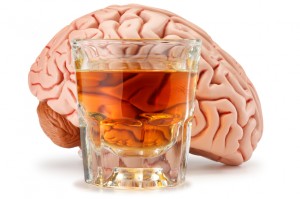How Alcohol Affects the Hippocampus
The hippocampus plays a major role within the brain of human beings and other vertebrates. The hippocampus is a part of the limbic system and its most important role is in the storing and breaking down information in order for it to go from short-term memory to long-term memory. Humans and other mammals actually have two hippocampi. These hippocampi are located on either side of the brain.
In Alzheimer’s disease the hippocampus is one of the first regions of the brain to suffer damage. This is why those who have Alzheimer’s disease have such a hard time with their memory and disorientation is one of their first symptoms. As the hippocampus suffers more damage they may lose long-term and short-term memory permanently. Damage to the hippocampus can also come from oxygen starvation, encephalitis, epilepsy and even alcohol.
So just how does alcohol affect the hippocampus?
When people drink alcohol and seem to lose coordination, become disoriented, and lose memories from when they were drinking, that is because the hippocampus has been affected. Ethanol is the type of alcohol found in alcoholic beverages and can cause severe impairment in the individuals who drink it. Alcohol acts a general nervous system depressant and affects specific areas of the brain to more of an extent in comparison with others. Losing memories or memory impairment due to alcohol is linked to the disruption of the hippocampus. Alcohol affects the hippocampus by damaging the hippocampus cells which are involved with the formation of memories. Drinking a lot of alcohol will significantly inhibit the formation of memories since the hippocampus plays such a big role in making them.
For instance, a long-term memory which can be stored for a few days up to a lifetime has to go through three processes. : encoding stage, storage and the retrieval stage. Each one of these individual process which are integral in storing long-term memory are alcohol affecting the hippocampus.
Alcohol affects the hippocampus by inhibiting explicit memory too. Explicit memory requires conscious and intentional effort to recall. It includes everyday events and factual information. Alcohol affects the hippocampus and therefore affects explicit memory. A blackout from drinking is an example of alcohol’s effect on the hippocampus when it comes to explicit memory. Blackouts are caused by a rapid increase in blood alcohol levels and this distorts the neurons in the hippocampus, when this happens it impairs a person’s ability to remember moment to moment events, conversations, etc.
High doses of alcohol affect the hippocampus by also disrupting its ability to store factual information, also known as, semantic memory. Alcohol keeps the hippocampus from being able to consolidate information and encode it.
Alcohol affects the hippocampus most in these two areas of episodic memory and semantic memory or everyday events and factual information. The retrieval of this explicit memory is significantly impaired by alcohol. When asked to recall task for everyday events intoxicated participants do very poorly next to their sober counterparts. Alcohol impairs word recognition tasks, retrieval processes, and more.
The hippocampus is an important part of the brain that deals with the ability to function in everyday life. Alcohol affects the hippocampus in significant ways making the person who is intoxicated unable to remember much of anything and affecting their memory even when they sober up.


